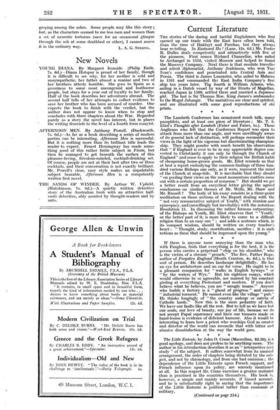The Lambeth Conference has occasioned much talk, many pamphlets, and
at least one piece of literature : Mr. T. S. Eliot's Thoughts after Lambeth (Faber and Faber, Is.). Those Anglicans who felt that the Conference Report was open to attack from more than one angle, and were unwillingly aware of its general lack of distinction, will perhaps reconsider their views in the light of his vigorous but discriminating champion- ship. They might ponder with much benefit his observation that " if England is ever to be- in any appreciable degree con- verted to Christianity it can only be through the Church of England" and cease to apply to their religion the British habit of cheapening home-grown goods. Mr. Eliot reminds us that at best a report embodying the common findings of three hun- dred various Bishops can only, as it were, represent the mind of the Church at neap-tide. It is inevitable that they should " on pooling their views on the most momentous matters come out with a certain proportion of nonsense." But should we get a better result from an encyclical letter giving the agreed conclusions on similar themes of Mr. Wells, Mr. Shaw and Mr. Russell ? The body of his essay consists in a three-point meditation on those sections of the Report dealing with the " not very remunerative subject of Youth," with reunion and episcopacy, and (unwillingly but inevitably) with the notorious Resolution 15. In discussing the rather fatuous outpourings
-of the Bishops on Youth, Mr. Eliot observes that " ' Youth, or the better part of it, is more likely to come to a difficult religion than to an easy one " ' - and adds a sentence which, in its compact wisdom, should be written on every teacher's heart : Thought, study, mortification, sacrifice : it is such notions as these that should be impressed upon the young."






























 Previous page
Previous page